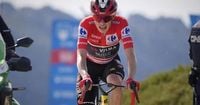Madrid’s wide boulevards, usually reserved for the final, triumphant parade of the Spanish Vuelta, were instead a stage for both celebration and controversy on the evening of September 14, 2025. As the world’s top cyclists prepared for the last leg of the grueling three-week Grand Tour, a massive security presence and a wave of political activism marked the day, turning what is often a festive sporting climax into a high-stakes diplomatic moment.
More than 1,500 police officers were deployed across the Spanish capital, supplementing the 130 officers who had already been traveling with the race, in anticipation of renewed pro-Palestinian protests. The extraordinary security measures reflected the unprecedented disruption that had dogged the Vuelta’s final ten days, as activists repeatedly targeted the Israeli-owned Premier Tech cycling team, thrusting the intersection of sport and geopolitics into the international spotlight.
For many Spaniards, the Vuelta offered a rare global platform to protest Israel’s ongoing military campaign in Gaza, a conflict that has killed at least 64,803 people according to Gaza’s health ministry. From the bucolic hills of northwestern Spain to the bustling streets of Madrid, demonstrators—many waving Palestinian flags—made their presence felt at nearly every stage. Rosana Prieto, an alderperson from a small village far from Madrid’s urban sprawl, said, “The protests were born from the idea that our only chance to defend human rights regarding Israel is the Spanish Vuelta. It is an international spotlight for us to say that we are against what Israel is doing.”
The activism was not without consequence. Six of the last ten days of racing were either cut short or interrupted, with more than 20 protesters detained by police. During the 15th stage, a protester carrying a Palestine flag ran dangerously close to the peloton, causing two cyclists to crash. Though both initially continued, one was forced to withdraw from the race. Notably, neither of the riders involved was from the Premier Tech team, which had already removed its name from team uniforms in an effort to defuse tensions.
The disruptions prompted heated debate within the cycling community. Joxean Fernández Matxin, the team boss of UAE Emirates, criticized the protesters’ aggressive tactics, saying that some had “hit riders with flag poles and tossed tacks in their path.” The security challenge was immense. “It was logistically impossible to lock down the entire route,” officials admitted, as much of the Vuelta winds through rural back-roads and forested terrain.
Amid the unrest, the sporting drama rolled on. Jonas Vingegaard of team Visma-Lease a Bike entered the final stage with a commanding lead of 1 minute and 16 seconds over João Almeida. The mostly ceremonial ride into Madrid was expected to cement Vingegaard’s third Grand Tour title, adding to his Tour de France victories in 2022 and 2023. “Everyone has a right to protest, but it’s a shame that it has to happen here and in this way and that we can’t finish the race,” Vingegaard lamented after a stage finish was cut short. The sentiment was echoed by many riders, who on September 10 voted to quit the race if their safety was again put at risk—a stark reminder of the mounting tension between athletic competition and political activism.
The Premier Tech team, owned by Israeli-Canadian businessman Sylvan Adams, found itself at the center of the storm. Adams, who has long promoted Israel through sports, orchestrated the start of the 2018 Giro d’Italia in Israel and has been a vocal advocate for his team’s continued participation. “Great job to Sylvan and Israel’s cycling team for not giving in to hate and intimidation,” Israeli Prime Minister Benjamin Netanyahu posted on September 5. Yet the team’s efforts to keep a low profile—avoiding media and stripping their uniforms of the team name—did little to quell the protests. While only one Israeli rider competed for Premier Tech at the Vuelta, the team remained a lightning rod for controversy.
Spain’s left-wing government tacitly endorsed the demonstrations, with Foreign Minister José Manuel Albares expressing support for expelling the Israeli-owned team from the race. Pilar Alegría, the government’s spokesperson and minister of sports and education, declared, “Neutrality is no longer possible in the face of the death and destruction in Gaza.” The government’s stance was further underscored by Prime Minister Pedro Sánchez, who joined Ireland and Norway in recognizing a Palestinian state last year and announced in a nationally televised address this week an arms embargo on Israel, as well as a ban on fuel deliveries destined for Israeli ports. These moves inflamed diplomatic tensions, prompting Israel to accuse Spain of antisemitism and making “blatant genocidal threats.”
The broader European response was just as charged. European Commission president Ursula von der Leyen called for a partial suspension of trade ties with Israel, while the Netherlands threatened to boycott the Eurovision Song Contest if Israel is allowed to participate next year. Analyst Oriol Bartomeus, a political scientist at the Autonomous University of Barcelona, observed, “What is happening at the Vuelta is a symptom of the anger of the left over this issue. This is poised to be a major point of cohesion of Spanish society. Sánchez is not stupid, and he has gotten right in there.”
Meanwhile, the race’s sporting narrative continued to unfold. American rider Matthew Riccitello was poised to win the Vuelta’s white jersey as the fastest cyclist under 25, offering a bright spot amid the turmoil. Yet the mood among competitors was tense. Tadej Pogačar, the reigning Tour de France champion who skipped the Vuelta, expressed concern that the protests could spill over into other races. “I think all the riders are a little scared of what could happen. When we see what’s going on at the Vuelta, we talk about it and we think it could happen here or in other races between now and the end of the season,” Pogačar told reporters in Quebec, where protests had already begun to shadow other cycling events.
As the final stage route was shortened by five kilometers due to traffic and security concerns, activists in Barcelona launched a fleet of ships carrying humanitarian aid, aiming to break Israel’s naval blockade of Gaza. The convergence of sporting excellence, political protest, and humanitarian activism made the 2025 Vuelta a microcosm of the world’s most pressing debates.
With the last kilometers winding through a city on edge, Madrid’s grand cycling finale was anything but routine. Whether the world remembers this Vuelta for its champion or the cause that overshadowed the race, one thing is clear: the intersection of sport and politics has never felt so immediate—or so consequential.






